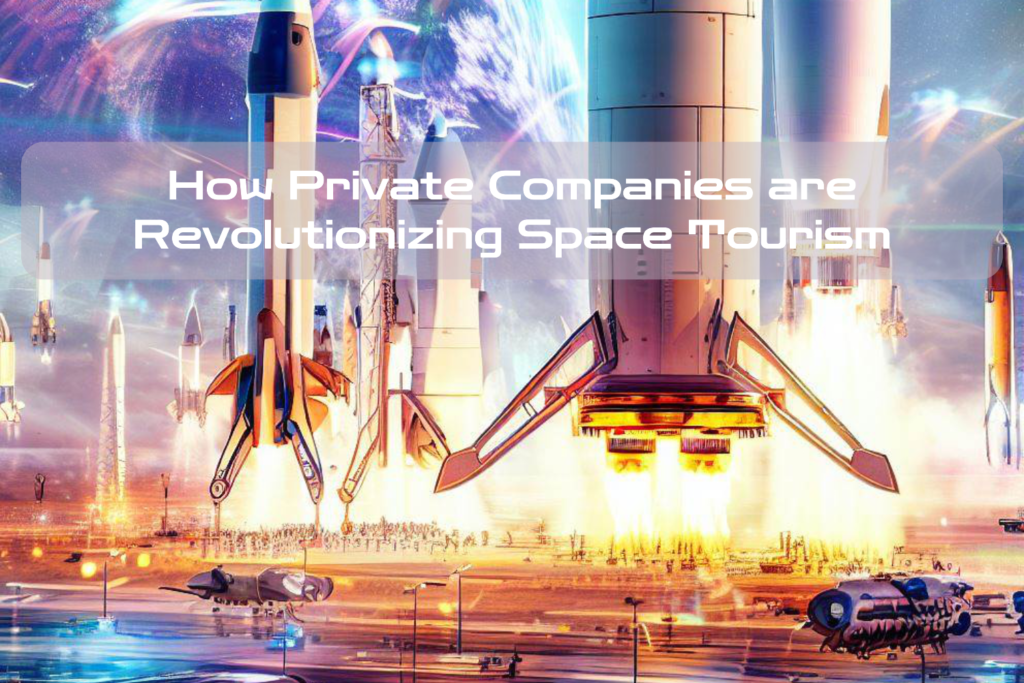Brief History of Space Tourism
Space tourism is quickly becoming a reality, but it wasn’t always so. The idea of regular people paying to travel to space dates back to the late 20th century.
In 2001, American businessman Dennis Tito became the first-ever private citizen to venture into space on a Russian spacecraft. His trip marked the beginning of a new era in the exploration of space – an era in which wealthy individuals could purchase their own tickets for a voyage beyond Earth’s atmosphere.
Since Tito’s trip, there have been other notable space tourism ventures, such as British entrepreneur Richard Branson’s Virgin Galactic and Elon Musk’s SpaceX. These companies have made significant strides towards making trips into space more accessible and affordable for tourists.
Definition of private companies in space tourism
Private companies involved in space tourism are those that offer commercial opportunities for individuals or organizations to travel to and from outer space. These companies contrast with government-run or funded programs, which are typically only available to trained astronauts or researchers.
Private companies like Virgin Galactic, Blue Origin, and SpaceX have been at the forefront of developing new technologies that will make it possible for more people to explore space. They have also been working on ways to reduce costs and increase safety features, all while making sure that environmental impact is kept to a minimum.
Private Companies Leading the Way

Overview of Private Companies Involved in Space Tourism
Since the dawn of space tourism, private companies have played an important role in driving innovation and competition in the industry. The most well-known companies involved are Virgin Galactic, Blue Origin, and SpaceX. Each company has its own unique approach to space tourism, but they all share a common goal: to make space travel accessible to more people.
Virgin Galactic, founded by Sir Richard Branson, is perhaps the most recognizable name in commercial spaceflight. They have been working on their spacecraft, SpaceShipTwo, for over a decade now and have already taken a few test flights with crew members.
They aim to offer suborbital flights that reach an altitude of 80 kilometres above sea level.
Blue Origin is another prominent player in the industry led by Amazon CEO Jeff Bezos.
Their New Shepard spacecraft is designed for suborbital flights as well, and they have had several successful test flights so far. Blue Origin is also developing a larger capsule called New Glenn that could take passengers into orbit.
SpaceX is best known for its rocket launches and cargo missions for NASA, but they also plan to offer passenger trips to space someday soon. Their Starship spacecraft, which can carry up to 100 passengers at once, will be used for interplanetary travel as well.
How These Companies are Driving Innovation and Competition in the Industry
These private companies are not just competing against each other; they are also pushing government agencies like NASA and ESA (European Space Agency) to innovate faster than ever before. By creating cheaper and more efficient spacecraft capable of carrying civilians into space, these companies are paving the way towards a booming new market within tourism.
The competition between these companies has driven them further than government agencies might be willing or able to go.
For example, SpaceX’s reusable rockets have greatly reduced the cost of launching payloads into space.
Virgin Galactic has developed new types of rocket engines that use cleaner fuels and produce less pollution.
Without private companies, space tourism would not have come as far as it has.
Their ambitious goals and willingness to take risks have led to significant advancements in technology in a relatively short period of time. These companies are helping pave the way towards a future where tourists can visit space just like any other destination on Earth.
The Challenges Faced by Private Companies

Regulatory Hurdles and Legal Issues
While private companies are driving innovation and competition in the space tourism industry, they also face a number of hurdles in terms of regulations and legal issues. For example, the Federal Aviation Administration (FAA) regulates commercial space transportation, which means that private companies must adhere to strict safety standards in order to obtain a license to operate. This can be a lengthy and costly process, which can deter some companies from entering the market.
Additionally, there are still many unanswered legal questions surrounding space tourism.
For example, what happens if a passenger is injured or killed during a flight?
Who is liable for damages?
These kinds of questions have yet to be fully addressed by lawmakers and regulators.
Financial Obstacles and Funding Sources
Another major challenge facing private companies in the space tourism industry is securing adequate funding. Developing spacecraft that are capable of carrying humans into space is an expensive endeavour, and it can take years before a company sees any return on its investment. As such, many companies struggle to find investors who are willing to finance their projects.
One potential solution to this problem is public-private partnerships. By partnering with government agencies such as NASA or the European Space Agency (ESA), private companies can access government funding while also benefiting from the expertise and resources of these organizations.
The Future of Space Tourism with Private Companies
Despite these challenges, many experts believe that private companies will continue to play an important role in the development of space tourism. With advances in technology and infrastructure, it may become increasingly feasible for these companies to make space travel more accessible and affordable for tourists.
However, as the industry continues to grow, it will be important for lawmakers and regulators to keep pace with these changes in order to ensure that passengers remain safe and that there is accountability when things go wrong. Ultimately, the future of space tourism with private companies will depend on a variety of factors, from technological breakthroughs to changes in public opinion and government policy.
The Future of Space Tourism with Private Companies

Potential for increased accessibility and affordability for tourists
One of the most exciting things about private companies leading the way in space tourism is the potential for increased accessibility and affordability for tourists. When NASA was the main player in space exploration, trips to space were only available to a select few astronauts. But private companies are working on creating more affordable and accessible options for everyday people to experience space travel.
Virgin Galactic, for example, is aiming to offer suborbital space flights that will allow passengers to experience weightlessness and see incredible views of Earth from above. The cost per ticket is currently quite high, but as technology improves and competition increases in the industry, it’s likely that prices will come down over time.
Advancements in technology and infrastructure
In order to make space tourism accessible and affordable, private companies are investing heavily in advancements in technology and infrastructure. This includes developing reusable rockets that can lower the cost of launches, as well as creating new materials that can better withstand the harsh conditions of space travel.
SpaceX is one company that has made incredible strides in reusable rockets with its Falcon 9 rocket system. They’ve successfully landed multiple rocket boosters back on Earth after launching payloads into orbit, which has significant cost-saving implications.
In addition to technological advancements, infrastructure improvements are also key to expanding access to space tourism. The development of new launch sites around the world will allow more people to have access to spaceflight opportunities without having to travel long distances.
The potential impact on our society
The growth of private companies in the field of space tourism could have a significant impact on society as a whole. As more people are able to experience space travel firsthand, it’s possible that we’ll begin looking at our planet differently – with a greater sense of awe and appreciation for the fragile ecosystem we call home.
Additionally, the technological advancements made in the pursuit of space tourism could have far-reaching implications beyond the industry itself. For example, new materials developed for space travel could have applications in other fields, such as medicine or environmental science.
Overall, the future of space tourism with private companies is incredibly exciting. While there are undoubtedly challenges that must be overcome, the potential benefits for our society and our understanding of our place in the universe make this an endeavor worth pursuing.
Ethical Considerations

Environmental Impact of Space Tourism
As the space tourism industry continues to grow, concerns about its environmental impact have become more prominent. The rockets used to launch spacecraft emit large amounts of carbon dioxide and other pollutants into the atmosphere.
Additionally, space debris left behind by rocket launches poses a threat to satellites and other spacecraft in orbit around Earth. Private companies involved in space tourism are aware of these environmental concerns, and many are taking steps to minimize their impact.
For example, Virgin Galactic has announced plans to use a zero-emission aircraft for transportation to its launch site, while Blue Origin is exploring the use of reusable rockets to reduce waste and emissions. It remains to be seen whether these efforts will be enough to mitigate the environmental impact of space tourism.
Safety Concerns for Passengers
With any new industry comes the need for safety regulations and protocols. Space tourism is no exception.
In fact, given the risks associated with travelling beyond Earth’s atmosphere, it is even more important that passenger safety be a top priority. Private companies involved in space tourism must ensure that their spacecraft are designed and built with safety in mind.
This includes rigorous testing and certification processes, as well as ongoing monitoring and maintenance of spacecraft systems. Additionally, companies must provide comprehensive training for passengers on how to operate emergency equipment and respond in case of an emergency situation.
While private companies are taking steps to address safety concerns, accidents can still happen. It is important that regulatory bodies work closely with these companies to establish clear safety standards and ensure compliance with those standards at all times.
Final Thoughts

The future looks bright for space tourism with private companies at the helm. As these companies continue to perfect their technologies and reduce costs, we can expect to see more people taking trips into orbit or even beyond.
This will not only be an exciting experience for tourists but could also lead to important scientific discoveries and new opportunities for economic growth. Of course, there are ethical considerations that must be taken into account as well.
Space tourism could have negative impacts on the environment, and safety concerns for passengers must be addressed. However, by working together with governments and regulatory agencies, private companies can ensure that these issues are properly addressed.
Overall, it’s clear that private companies are playing a critical role in shaping the future of space tourism. Their drive towards innovation and commercial success is benefiting us all – opening up extraordinary new opportunities beyond our planet’s atmosphere that were once unimaginable – while also inspiring new generations who look to travel among stars as their next great adventure!

C M, a seasoned editor, journalist, and consultant, is deeply fascinated by the convergence of technology, space, and the future of humanity.
With a particular interest in transhumanity, futurology, and the philosophical and ethical dimensions of these domains, C M serves as the lead contributor to SpaceSpotlight and TranscendSphere.
When not penning insightful articles on these rapidly evolving fields, C M indulges in their love for podcasts and books, proudly embracing their status as a ‘Happy Nerd Extraordinaire!’



